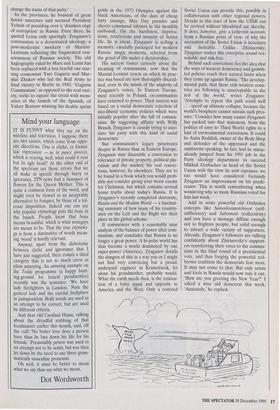Mind your language
IT IS FUNNY what they say on the wireless and television. I suppose there are two causes, which come from oppo- site directions. One is cliché, or formu- laic expression — as in peace process, which is rearing, well, what could it rear but its ugly head? At the other end of the spectrum are those errors that we all make in speech through hurry or ignorance. ITN news had a beauquet of flowers for the Queen Mother. This is quite a common form of the word, and might even be viewed as an acceptable alternative to bouquet, by those of a tol- erant disposition. Indeed one can see why popular etymology puts the beau in the bunch. People know that beau means beautiful, which is what nosegays are meant to be. That the true etymolo- gy is from a diminutive of words mean- ing 'wood' is hardly relevant. Anyway, apart from the dichotomy between cliché and ignorance that I have just suggested, there comes a third category that is not so much error as plain annoying. An amusing example on the Today programme (a happy hunt- ing-ground for lexical peculiarities) recently was the sentence: 'We have lady firefighters in London.' Note the genteel lady and the careful firefighters in juxtaposition. Both words are used in an attempt to be correct, but are used by different criteria.
And dear old Cardinal Hume, talking about the dreadful stabbing of that headmaster earlier this month, said, off the cuff: 'No better love does a person have than. he lays down his life for his friends.' Presumably person was used in an attempt not to be sexist, but was then let down by the need to use three gram- matically masculine pronouns.
Oh well, it must be better to mean what we say than say what we mean.
Dot Wordsworth


















































 Previous page
Previous page